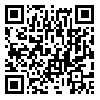Volume 10, Issue 38 (3-2004)
RJMS 2004, 10(38): 859-866 |
Back to browse issues page
Download citation:
BibTeX | RIS | EndNote | Medlars | ProCite | Reference Manager | RefWorks
Send citation to:



BibTeX | RIS | EndNote | Medlars | ProCite | Reference Manager | RefWorks
Send citation to:
Hagh Azali M, Shahrad Bejestani H, Kabir A, Shooshtarizadeh T. COMPARISON OF VITAMIN B12 LEVEL AND ITS NEUROLOGICAL SIGNS AND SYMPTOMS IN WELL-CONTROLLED DIABETIC PATIENTS WITH POOR-CONTROLLED ONES. RJMS 2004; 10 (38) :859-866
URL: http://rjms.iums.ac.ir/article-1-236-en.html
URL: http://rjms.iums.ac.ir/article-1-236-en.html
Abstract: (28645 Views)
Some studies have shown the relief of neurosensory signs in diabetic patients by vitamin B12 supplementation. Symptomatic therapy is not a goal in medicine therefore, for detecting causes of this relief, vitamin B12 level was compared in poor and well-controlled diabetic patients in this study. Diabetes mellitus, which is the most common metabolic disease, has systemic effect on immunity, neurosensory, cardiovascular, kidney, skin and other organs and it causes organic and psychological disorders in patients. It increases treatment cost and reduces the efficient personnel, directly and indirectly. Knowing the mechanism of vitamin B12 effect on neurosensory signs of diabetes mellitus can help us in preventive care. It has a significant high quality, it is more cost-benefit and is prior to treatment. This cross-sectioal study was carried out on 99 patients who referred to endocrine part of Rasool-e-Akram Hospital. Mean age of the patients was 58.5±4 and 55 patients(56.1%) were female. History taking, physical examination and blood sample was done for determining vitamin B12 and hemoglobin A1c. Vitamin B12 level was compared in poor and well-conrolled diabetic patients. SPSS software was used for analysis of the data. The most common signs and symptoms consisted of hand and foot neuropathy, polyuria, nocturia, retinopathy, polydypsia, amblyopia, weight loss, distal paresthesia, second cranial nerve neuropathy, touch and vibration sense loss and nephropathy. Vitamin B12 level had no significant difference in poor and well-controlled diabetic patients. Neuropathy, polyuria, polydypsia and retinopathy were the most common symptoms. Neuropathy in 43.4% of patients can be due to duration of diabetes in these patients(10 years). Chronic complications increase with duration of hyperglycemia. Insufficient use of vitamin B12 is not a risk facor for vitamin B12 deficiency. Cobalamine supplements are inexpensive and nontoxic. Adding these supplements in primary stages may prevent irreversible neurosensory complications. Because of low prevalence of vitamin B12 deficiency in patients with type II diabetes, prophylactic administration of vitamin B12 to all of these patients is not suggested. Long-scale, multicentered and controlled study for determining the patients with higher risk for vitamin B12 deficiency is also essential.
Type of Study: Research |
Subject:
Endocrinology & Metabolism





